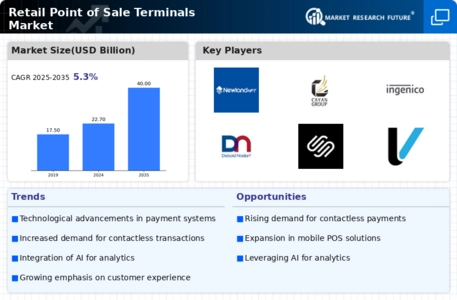Market Trends
Key Emerging Trends in the Retail Point of Sale Terminals Market
The Retail Point of Sale (POS) Terminals market is experiencing a wave of transformative trends that are reshaping the way businesses conduct transactions and manage their operations. One prominent trend is the rise of mobile POS systems. With the ubiquity of smartphones and tablets, retailers are increasingly adopting mobile POS solutions that provide flexibility and mobility. This trend allows for more dynamic and personalized customer interactions, enabling sales staff to assist customers on the shop floor, reducing wait times, and enhancing the overall shopping experience.
Another significant trend is the growing adoption of cloud-based POS systems. Cloud technology offers retailers the advantages of scalability, accessibility, and real-time data insights. Cloud-based POS solutions enable businesses to manage multiple locations seamlessly, streamline updates and maintenance, and access data from anywhere with an internet connection. This trend aligns with the broader shift towards digitalization in the retail sector, allowing businesses to stay agile and responsive to changing market conditions.
Contactless payments have become increasingly prevalent, driven in part by the global response to the COVID-19 pandemic. Consumers are now more inclined to use contactless payment methods, such as mobile wallets and contactless cards, for a faster and more hygienic transaction experience. As a result, the Retail POS Terminals market is witnessing an increased demand for devices that support contactless payments, providing a convenient and secure payment option for both retailers and customers.
Omnichannel retailing is another trend that is shaping the Retail POS Terminals market. Consumers expect a seamless shopping experience across various channels, including online and offline. Retailers are investing in POS systems that integrate with e-commerce platforms, inventory management systems, and customer relationship management tools to provide a unified experience. This trend emphasizes the need for POS solutions that can facilitate consistent and cohesive interactions regardless of the channel through which a sale is made.
Data analytics and business intelligence are playing an increasingly vital role in the Retail POS Terminals market. Retailers are leveraging POS data to gain insights into customer behavior, inventory management, and overall business performance. Advanced analytics tools integrated into POS systems enable businesses to make informed decisions, personalize marketing strategies, and optimize their operations. This trend reflects a shift towards data-driven decision-making in the retail sector.
Inclusivity and accessibility are emerging trends in the Retail POS Terminals market. POS solutions are being designed to accommodate diverse payment methods, including cryptocurrencies. This trend recognizes the evolving landscape of digital currencies and aims to provide retailers with the flexibility to accept a broader range of payment options. Additionally, there is a focus on designing POS interfaces that are user-friendly and accessible to individuals with varying levels of technological expertise.
The sustainability movement is influencing the Retail POS Terminals market, with an increasing emphasis on eco-friendly and energy-efficient solutions. Retailers are seeking POS systems that align with their sustainability goals and contribute to reducing environmental impact. This trend reflects a broader awareness within the industry about the importance of adopting environmentally responsible practices.
Lastly, the integration of artificial intelligence (AI) and machine learning (ML) capabilities into POS systems is a notable trend. These technologies enhance the capabilities of POS terminals by enabling predictive analytics, fraud detection, and personalized customer interactions. AI and ML algorithms contribute to more efficient and intelligent decision-making processes, allowing retailers to stay ahead of market trends and customer preferences.

















Leave a Comment